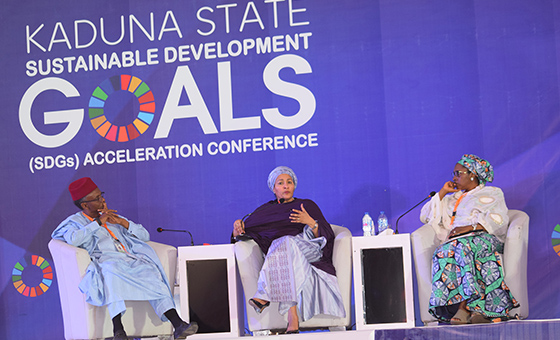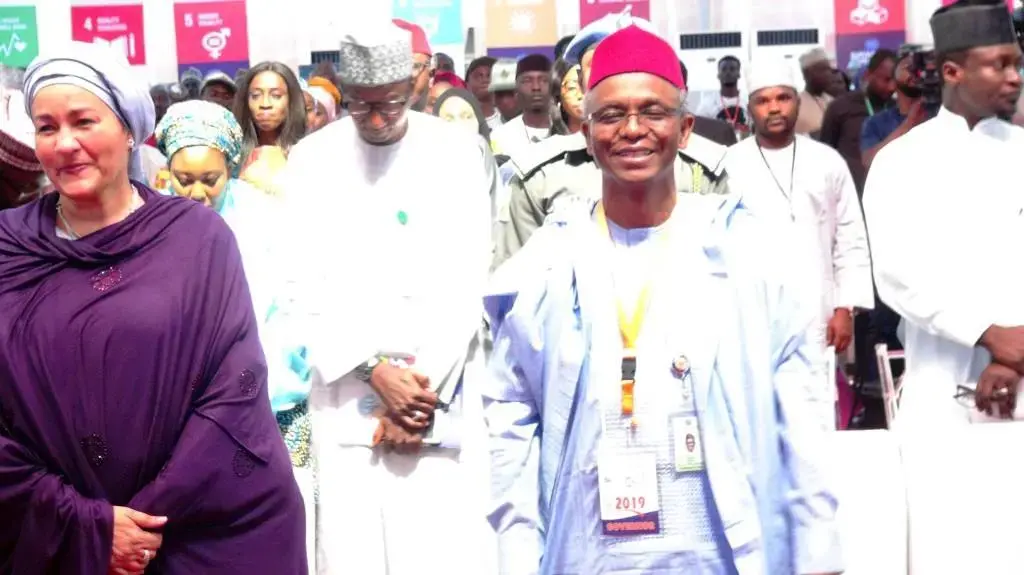The Kaduna State Conference on Building Partnership for Accelerated Progress towards the SDGs
Kaduna State- 22 – 23 January, 2019. The two days event was attended by High-level Nigerias government officials, UNDSG and UNFPA Deputy Regional Director West and Central Africa, Dr. Mamadou Kante, who represented Mabingue Ngom, Regional Director Africa, UN Resident Coordinator in Nigeria and Heads of UN Agencies, Ambassadors of Countries, CBOs and the media groups.
‘We’re Pace-Setter in Implementation of SDGs in Nigeria’ – el-Rufai
Kicking-Off the SDGs Acceleration Conference, Governor Malam Nasir El-Rufai, said his state stands out as a pace-setter in the implementation of the Sustainable Development Goals (SDGs). He explained that Kaduna made history as first state in Nigeria to present an in-depth analysis of its SDGs data and strategy for implementation at the 72nd United Nations General Assembly, held in Kaduna on “Development Vision and Aspiration of the State within the context of the SDGs and the 2030’’
The Kaduna state governor maintained that his administration has achieved a lot through investment in data.
El-rufai, while explaining his achievements before the Deputy Secretary-General of the United Nations (UN), Amina Mohammed, and other participants at the conference, says he inherited 4,200 public primary schools in dehumanizing conditions.
El-Rufai who also laid foundation for the Amina Mohammed SDGs Data Lab Building said that he inherited enrolment rate stagnant at 1.1 million pupils, with at least 50 per cent of pupils taking lessons on the floor because of lack of furniture’s in June 2015.
He said Amina Mohammed’s building, which is funded by the Gates Foundation, will house analytics operations to deepen the convergence and analysis of large data.
According to the governor : “In our effort to improve teaching quality standards, the Kaduna State Universal Basic Education Board (SUBEB) had in June 2017 conducted a Primary Four competency test for teachers.”
As a way of reforming education system in the state the governor revealed that out 33,000 teachers that sat competence text 21,780 teachers failed to meet the 75% benchmark.
‘No country, no region’ can tackle global challenges alone says UN’s Mohammed
“In the regions today, no country is alone. Our borders don’t make any difference in the Sahel when we talk about issues of terrorism, migration, and climate change”, Ms. Mohammed said on Tuesday at the opening of the Kaduna State Sustainable Development Goals (SDGs) Acceleration Conference 2019.
“No country, no region can tackle the global challenges of today”, she spelled out.
Under the theme "Building effective partnership for accelerated progress towards the Sustainable Development Goals", the two-day conference aims to fortify partnerships to fast-track implementation of the global goals, which each country is adapting to reach ambitious targets on poverty and hunger eradication, among other challenges.

United Nations Deputy Secretary-General Amina Mohammed (center) at the Kaduna State Sustainable Developmen Goals (SDG) Acceleration Conference on 22 January, 2019,
Ms. Mohammed strongly advocated for gender parity saying that “part of our population, especially women and girls, have to be put at the centre of the results” and not only “at the centre of our policies”.
She continued, “we need to see young people at the centre of the impact that is made on everyone’s life. Because they are not the future tomorrow; they are the future today.” On the rise of global hunger in the past few years, Ms Mohammed says it is “a great concern”, She underscored that the world has more than enough to feed itself, but carelessness on the part of leaders make people to go to bed hungry.
Despite a global decline in the number of people living in poverty, the Deputy Secretary-General observed that there are many reasons why extreme poverty remains. She singled out the two explanations of “when there is no enabling environment and when there is no stability”.
The Deputy Secretary-General also argued that effective partnerships are vital to achieving the SDGs. urging that all participants in the conference which are drawn from representatives of federal and state governments, members of the international community, civil society organizations as well as local community authorities to form and maintain SDG's partnerships


